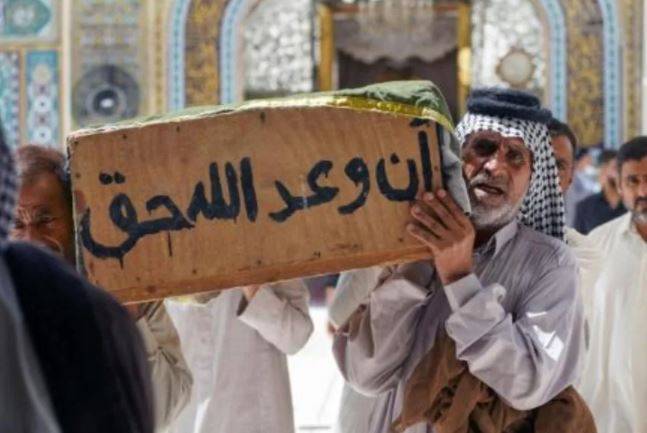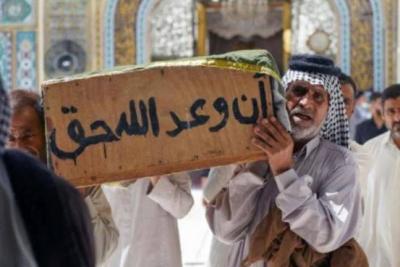Amid the rubble left by the massive fire in the COVID-19 patient care unit at Al-Hussein Hospital in Nasiriyah, southern Iraq, colorful blankets remained... In the area, relatives of the victims wept and expressed their severe anger. In the burned isolation unit, Abu Noor Al-Shawi, who lost several relatives, said, "A patient comes seeking treatment and ends up in a coffin... This is an unforgivable crime."
The grieving man added, while people around him tried to find their relatives among the wreckage and volunteers helped remove debris, "What happened to Dhi Qar province was a painful and distressing tragedy last night due to corruption and intentional negligence by the politicized Ministry of Health, which is affiliated with the ruling parties."
The dilapidated and inadequately equipped unit to resist fire was built at the end of 2020 in the Al-Hussein Hospital complex to treat COVID patients. It had a capacity for seventy patients, while the number of those who died in the fire reached 64. The fire was caused by an explosion of oxygen cylinders, according to a health source, and quickly spread without leaving any chance for patients or their visitors to escape.
The roof, made of metal sheets, collapsed, covering the charred walls in black, while blankets and clothes were scattered everywhere. The debris, from which smoke continued to rise, buried a wheelchair. Chaos reigned throughout most of the night as firefighters struggled for hours to control the flames while hundreds of residents rushed to the site in an attempt to evacuate trapped patients.
Before the fires were extinguished, while smoke still rose from the charred remains, relatives of the grieving victims entered the unit with their faces wrapped in their shirts, while others tore their clothes amidst heartbreaking screams.
"We heard their screams," said civil activist Hashim Al-Sumari, who came to help. "We could hear their screams, but we couldn't do much... We heard their screams as they choked." Al-Sumari blamed local authorities and called for "a full investigation into what happened at the hospital and the cause of the fire." He added, "This is a shed that even animals wouldn’t live under. Where is the care, where are the health and provincial managers, the officials, and the parties that speak in the name of religion... The people have no power left."
For his part, Adi Al-Jabri, who lost four family members, said, "We want to send a message to those who committed crimes yesterday against Nasiriyah and our families: Haven't you had enough of us? How long will you keep killing us and our families?" Al-Jabri continued angrily, "Only the poor's hospital burns... What did the Iraqi people do, and what did the poor do who bring their patients here under this metal roof?"
The elderly man added, "We don't have a government; we have a gang... Criminals ruling the country. Four of my cousins were killed, and my neighbors were killed here." Corruption, neglect, and negligence were words repeated on everyone's lips as an expression of their pain.
This fire is the second to engulf a hospital in Iraq, where a fire broke out at Ibn Al-Khatib Hospital in Baghdad, which treats severe COVID cases, in April, resulting in the deaths of 82 people and injuries to dozens.
### Burials and Anger
In an official tally that included names and professions of victims circulated by local media on Tuesday, it appeared that most of them were housewives.
The funerals in the holy Shiite city of Najaf, where some bodies were transferred, and in smaller towns like Al-Diwaniyah, where six people from one family were buried, and Al-Nasr, where four brothers were buried, turned into marches of anger on Tuesday against local officials accused of "corruption and neglect."
Parallel protests erupted in Nasiriyah, which was the heart of the popular uprising in late 2019, at the peak of anti-government protests the country experienced. Hundreds of young protesters gathered in the city and vowed to take control of the sit-in squares to demand accountability for those responsible for the incident.
Dozens blocked the entrances to some hospitals, demanding the transfer of patients to a new hospital with more than 400 beds that opened in June but has not yet started operating for unknown reasons.
It seems the protesters got what they wanted during the day as authorities ordered all patients from Al-Hussein Hospital to be transferred to the new facility to receive COVID patients.
The director of Al-Hussein Hospital and the health official in the province were dismissed on the orders of Prime Minister Mustafa Al-Kadhimi, but these measures were considered inconsequential.
Yasser Al-Barak, a professor at the University of Dhi Qar, expressed his indignation, stating, "Once again, politicians have proven their inability to manage the country. We go from tragedy to tragedy; the situation of Iraqis worsens day by day, and no one is held accountable."
The Ministry of Interior recorded seven thousand fires between January and March 2021 alone. The healthcare system has suffered from deterioration for decades due to the economic crisis, wars, and corruption. The pandemic exacerbated the situation as Iraq recorded more than 1.4 million COVID infections, which led to the deaths of more than 17,000 people.




